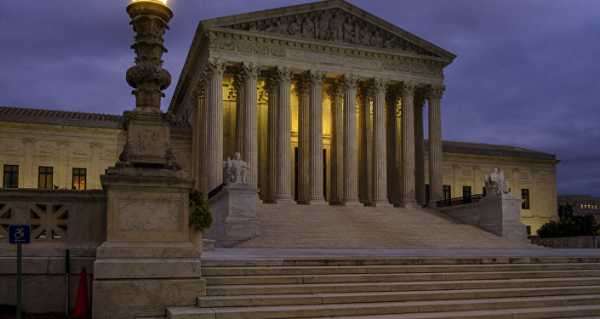
On 2 March, the US Supreme Court heard an oral argument on the Arizona case concerning the legality of the state’s prohibition of ballot harvesting and out-of-precinct voting. The dispute comes at a time when the Dems are pushing ahead with the H.R. 1 bill, which legalises ballot harvesting and loosens voting restrictions and verification rules.
The Supreme Court’s decision to take up the Brnovich vs DNC case is regarded as a breakthrough by conservatives given that earlier the court dismissed the GOP-initiated legal challenges over supposed election irregularities in Pennsylvania, Wisconsin, Arizona, Georgia, and Michigan during the 2020 vote.
Commenting on the Supreme Court’s rejection of the Pennsylvania election rules case on 22 February, Justice Clarence Thomas warned the court it was missing “an ideal opportunity to address just what authority non-legislative officials have to set election rules, and to do so well before the next election cycle.”
How Dems Used ‘Race Card’ to Target Arizona Election Rules
The case brought in by Arizona Attorney General Mark Brnovich is seeking to affirm that the state’s rules restricting ballot harvesting by third parties and out-of-precinct policy, which doesn’t count ballots cast in person on Election Day outside voters’ assigned precincts, are legitimate and important for ensuring the state’s election integrity.
Arizona’s out-of precinct policy and the ballot-collection law were first challenged by “several arms of the Democratic Party (DNC)” ahead of the 2016 general elections, under the pretext that the provisions violate the First and Fourteenth Amendments as well as Section 2 of Voting Rights Act by impacting the electoral opportunities of ethnic minorities.
The DNC further alleged that the rule prohibiting unlimited third party ballot harvesting was enacted specifically to “suppress voting by Hispanic and Native American voters.” While arguing that this was not the case, Brnovich highlighted that the ballot harvesting practice is fraught with risks of “undue influence, fraud, ballot tampering, and voter intimidation.” Similarly, Arizona’s out-of-precinct policy is aimed at maintaining order at polling stations, avoiding overcrowding, and most importantly “mak[ing] it easier for election officials to monitor votes and prevent election fraud,” the petition specifies.
While the provisions in question were in place during the 2016 and 2020 general elections in Arizona, on 27 January 2021 the US Court of Appeals for the Ninth Circuit ruled that Arizona’s “ballot harvesting” law discriminates against minority voters and stated that discarding the provisional ballots of voters from wrong precincts was illegal too.
Judge William A. Fletcher, who was appointed by President Bill Clinton, insisted that Arizona’s strict election rules were racially motivated and “the anti-fraud rationale” advanced in their support “seem[ed] to have been contrived.”
The Ninth Circuit’s en banc decision prompted the Arizona attorney general to turn to the Supreme Court. It’s expected that SCOTUS will make a decision on the state’s election rules laws by summer 2021.

This photo from video provided by ABC7 Los Angeles shows an unofficial ballot drop box at Grace Baptist Church in Santa Clarita, Calif., in October, 2020. California’s ballot harvesting law is creating controversy this election year. The law allows for people to collect ballots from voters and return them to county election offices. Republicans have set up unofficial drop boxes in some counties with closely contested U.S. House races. State officials say the boxes are illegal and have ordered the party to remove them. But party leaders say they are using the boxes to collect ballots as the law allows. At least one Democratic campaign has designated volunteers who receive ballots at their homes from voters who want help in returning them.
What’s Behind Dems’ Concerns Over SCOTUS’ Decision?
The Supreme Court’s decision to consider the Arizona case triggered concerns in the US left-leaning press: according to CNN, by ruling in favour of the state’s two provisions in question “the court’s new conservative majority” would “weaken” key provisions of Voting Rights Act concerning racial discrimination.
Referring to the fuss in the left-leaning mainstream and social media, Dan McLaughlin of National Review suggested that the Left is playing a “race card” to cast a shadow over the GOP’s Arizona case.
There is yet another reason for the Dems to be concerned over the Arizona case. If the Supreme Court upholds Arizona’s election provisions it will create a precedent other red states are likely to follow, according to Los Angeles Times. Citing the Brennan Centre for Justice 19 February report, CNN noted that over 253 bills with strict voting rules had been carried over or introduced in 43 states across the US.
In addition, the Arizona case debate comes at a time when Democrats are pushing the H.R. 1 For the People Act of 2021 through US Congress. The bill particularly advocates nationwide ballot harvesting, mail-in and early voting, loosening voter verification requirements as well as other measures which have been recently denounced by the GOP as an “election overhaul bill that would increase opportunities for election fraud.” According to The Atlantic, Democrats have a narrow window of opportunity to pass the bill: in the aftermath of the 2022 midterms the party could potentially lose its slim majority in either chamber.

Armed Trump supporters at a protest now at the Maricopa County Recorder’s Office in Phoenix Arizona
Maricopa Election Audit and Mississippi Fraudulent Absentee Ballots
Meanwhile, two separate cases have recently indicated that the GOP’s concerns about the US election integrity have certain grounds. First, on 26 February, Superior Court Judge Timothy Thomason ruled that Maricopa County should provide 2.1 million ballots from the 3 November election to the Arizona state Senate and grant access to its election equipment to conduct an audit.
Commenting on the court’s decision, Arizona Senate President Karen Fann stated that the Republicans’ initiative was “never about overturning the election, it was about the integrity of the Arizona election system.” While the Maricopa Board of Supervisors signalled they “have nothing to hide,” it is unclear whether it will appeal Thomason’s decision, the Epoch Times reported.
Second, although Dems have repeatedly claimed that evidence of voter fraud involving absentee or mail ballots is minimal, the Mississippi case proved otherwise. On 3 March, Judge Jeff Weill ordered a new Democratic runoff in Aberdeen after it was found that 66 of 84 absentee ballots – about 78 percent – cast in the June 2020 Democratic Primary election were fraudulent. In the result of the vote Nicholas Holliday was declared the winner of Ward 1 over Robert Devaull by the margin of 37 votes. Judge Weill also revealed that 83 regular ballots were counted despite not being initialed by election workers, adding that instances of voter intimidation took place at the polling place on election day.
Sourse: sputniknews.com






